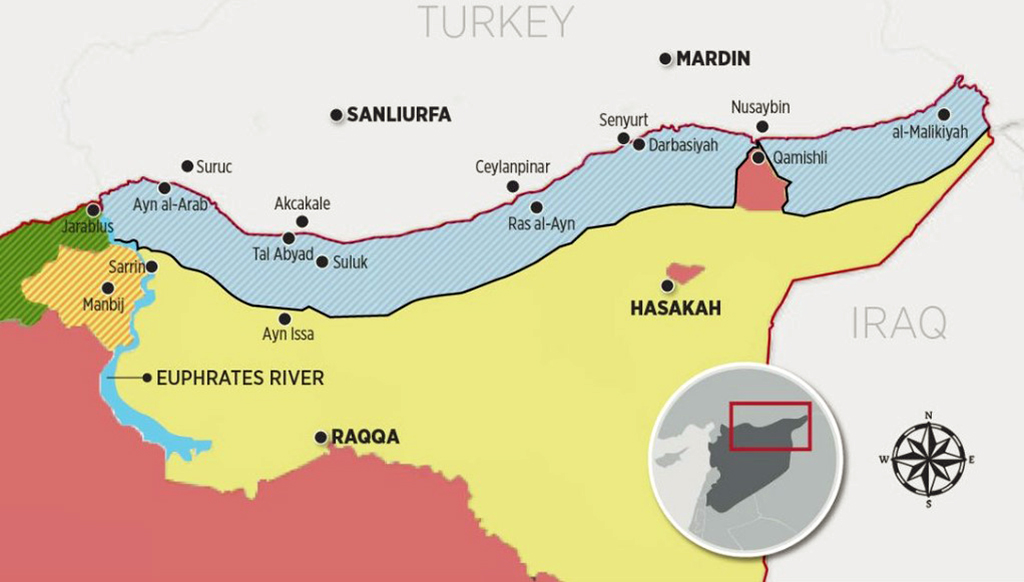Turkey cannot stomach the PKK's legitimization as a regional proxy – whatever the group calls itself.
The main problem is that the Americans believe their tactical interests to be above Turkey's strategic and vital interests. They refuse to understand that using the terrorist PKK organization, which U.S. officials claimed to support against Daesh for tactical reasons, as a proxy against Iran would be unacceptable for Turkey. There is no place for PKK terrorists in Syria and Iraq in the long run.
Washington, which lacks the necessary capacity to contain Iran, is making a huge mistake. Although sanctions will cripple the Iranian economy, the Iranian regime must not be confused with Saddam Hussein's Iraq or Afghanistan under the Taliban. Tehran could organize an affordable resistance through proxies. Claiming to lack an appetite for war, the Trump administration, in turn, cannot force Iran to renegotiate terms with the help of Gulf States or proxies like the PKK.
America's tendency to let tactical issues shape its policy on Turkey and the Middle East and refusal to revisit existing policies is highly problematic. This course of action merely gives more room for Russia to exploit the situation. U.S. officials haven't even learned the lesson of the Syrian civil war – that their misguided policies facilitated rapprochement between Turkey and Russia. Washington satisfies its greed for tactical wins by suffering major strategic setbacks.
It is crucial to view the Turkish National Security Council's reference to the peace corridor with this regional context in mind.
[Daily Sabah, 3 August 2019]

Peace corridor plan is a message to US
As expected, the National Security Council's most recent statement reiterated Turkey's commitment to combating terrorism. The communiqué made references to Turkish military operations in northern Iraq and the assassination of a Turkish diplomat in Erbil, criticized Interpol over the cancellation of arrest warrants for PKK leaders, urged NATO to act in line with the spirit of alliance and stressed Turkey's commitment to protecting its interests in the Eastern Mediterranean.
Share
As expected, the National Security Council's most recent statement reiterated Turkey's commitment to combating terrorism. The communiqué made references to Turkish military operations in northern Iraq and the assassination of a Turkish diplomat in Erbil, criticized Interpol over the cancellation of arrest warrants for PKK leaders, urged NATO to act in line with the spirit of alliance and stressed Turkey's commitment to protecting its interests in the Eastern Mediterranean.
For the first time, however, the Council mentioned the "establishment of a peace corridor" in Syria. President Recep Tayyip Erdoğan had originally used this phrase at a press conference in Osaka, Japan. This wording is stronger than the earlier phrase, "We will clear out the terror corridor along our border," that we encountered in previous statements. In other words, Turkey just took its commitment to cross-border counterterror operations in Syria and Iraq to the next level. In addition to conveying its intention to remove the terrorist organization PKK and its Syrian affiliate the People's Protection Units (YPG) from its southern border, the country moves to take action to set up safe zones and facilitate the repatriation of Syrian refugees.
Where does the peace corridor fit within the broader discussion on the safe zone?
The United States offers a safe zone, located east of the Euphrates River and 5 to 14 kilometers in depth, to Turkey. It would appear that Washington has partly sold the YPG on this plan, judging by the group's willingness to accept international oversight on a 5-kilometer-deep area. Behind closed doors in Ankara, U.S. officials have been trying to talk the Turks into accepting their terms, citing the threat of a Russian or regime takeover of the area. Turkish officials, in turn, are unhappy with Washington for reducing the proposed depth of the safe zone – after postponing its withdrawal from Syria. Simply put, the Turks want to get results. They do not wish to accept the U.S. offer, which would allow an international or American force to protect the YPG militants. From the Turkish perspective, a unilateral move to set up a safe zone east of the Euphrates River makes much more sense.
By contrast, the United States wants to keep PKK/YPG under its control as a trump card. A resurgence of Daesh isn't Washington's only concern. At the same time, U.S. officials see the PKK as a stopgap to contain Iran. Hence the increasing frequency of op-ed essays in U.S. media outlets on the prospect of a new peace process in Turkey. The authors of those pieces merely want PKK militants to cease their activities on Turkish soil to serve as American proxies in Iraq and Syria. They imagine that this plan, if adopted, would enable Washington to work with Turkey and the PKK against Iran. Unless the nature of the PKK's relationship with the United States changes, however, this offer of "disarmament" will remain meaningless.
Tags »
Related Articles








